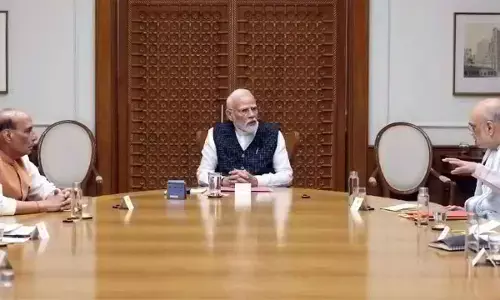The digital shift transforming education in India
Share :

India's educational sector is experiencing a profound transformation as it shifts towards online education, a change propelled by the dual forces of technological innovation and the unprecedented challenges of the global pandemic.
New Delhi: India's educational sector is experiencing a profound transformation as it shifts towards online education, a change propelled by the dual forces of technological innovation and the unprecedented challenges of the global pandemic.
The prominence of Edtech's future intensified during the Covid-19 impact on education, prompting a significant allocation of Rs 1.12 lakh crore in the fiscal year 2023-24 budget -- an impressive 8.26 per cent surge compared to the previous years.
This pivotal transition is altering not just how education is delivered -- moving from traditional classroom settings to digital platforms -- but also significantly expanding its scope and accessibility. It's a shift that promises to democratise education, making it more available and inclusive for students across all backgrounds.
The Drivers of Digital Adoption: Several important factors are driving the rapid adoption of online learning in India.
Digital Connectivity Revolution Amidst Pandemic Pressure: The confluence of affordable data plans and government-led digital infrastructure initiatives has dramatically increased internet access in India, its vast and drastic penetration in India can be confirmed by India Internet Report 2023 that says now even rural India has achieved around 425 million internet users surpassing its urban counterparts, indicating a strong 30 per cent growth. This pivotal development, amplified by the urgent demands of the Covid-19 pandemic, facilitated a swift pivot to online learning for educational continuity. This synchronised revolution not only bridged geographical and socio-economic gaps but also accelerated the seamless integration of digital platforms into the teaching and learning process.
Technological Transformations: The surge in online learning in India is propelled by advancements in digital technologies. Breakthroughs in learning management systems, interactive platforms, and mobile applications have revolutionised the accessibility and engagement of online education, accommodating diverse learning experiences. Aligned with the NEP’s bold vision, India aims for global academic eminence by 2024. Pledging a 50 per cent Gross Enrollment Ratio by 2035, the NEP 2020’s focus remains on technology as its key area. Beyond immersive realities, transformative technologies like blockchain are securing educational records and adaptive learning platforms are tailoring content to individual student strengths and weaknesses. These driving forces behind the adoption of online education in India are collectively enhancing the educational experience and making the sector huge, aligned with the needs of the digital age so much so that the Edtech sector is all set to reach the USD 4 billion mark by 2025.
Defining Features of Online Learning: Online education stands out for its learner-centric approach, which provides flexibility and customisation that traditional classrooms frequently cannot. According to a report by the Indian Institute of Technology (IIT) Kharagpur, 83 percent of Indian students prefer online learning platforms owing to flexibility and convenience. Technology, particularly AI and ML, is crucial in creating personalised learning experiences that can adapt to the unique needs of each student. For instance, AI-driven platforms can analyse a student's performance and learning habits to recommend personalised study schedules, resources, and revision strategies which is the need of the hour with the transformation in education in the digital age. A survey reveals that 62 per cent of Indian employees anticipate a significant technology-driven shift in the skills required for their roles in the next five years. Interactive and immersive technologies, such as virtual and augmented reality, are further enhancing online learning. These tools offer hands-on experiences and real-world simulations, providing learners with practical skills and a deeper understanding of complex subjects. An example would be medical students who can perform virtual surgeries and even history students who can explore ancient civilisations through immersive virtual tours.
Charting the Future Path: The journey towards an inclusive, technology-driven educational landscape in India is filled with opportunities and challenges. As online education expands, challenges arise in ensuring consistent and fair access to technology and internet connectivity. Overcoming these challenges is crucial for unlocking the full potential of online learning. Notably, the NEP 2020 advocates for diverse educational approaches, but the current taxation of technology and learning hardware at 18 per cent or 28 per cent hinders affordability. GST relief on school solutions can enhance accessibility, and transformation for affordable, high-quality education, thus mitigating the challenges, and taking a step towards a progressive future.
With the concerted efforts of the educational community, policymakers, and industry leaders, the path forward is promising. The objective is to build an education system that is accessible, affordable, and adaptable, meeting the diverse needs of learners in the 21st century, especially since it's the digital era.
As India forges ahead in its digital education journey, it envisions a future where learning is boundless, empowering every student with the knowledge and skills needed to thrive in a rapidly changing world.









